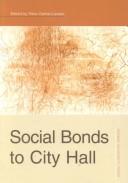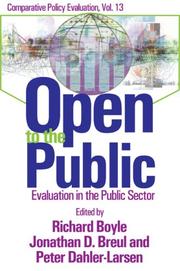| Listing 1 - 10 of 10 |
Sort by
|
Book
ISBN: 9780804776929 080477692X Year: 2012 Publisher: Stanford, California: Stanford Business Books,
Abstract | Keywords | Export | Availability | Bookmark
 Loading...
Loading...Choose an application
- Reference Manager
- EndNote
- RefWorks (Direct export to RefWorks)
Evaluation whether called by this name, quality assurance, audit, accreditation, or others is an important social activity. Any public or private organization that "lives in public" must now evaluate its activities, be evaluated by others, or evaluate others. What are the origins of this wave of evaluation? And, what worthwhile results emerge from it? The Evaluation Society argues that if we want to understand many of the norms, values, and expectations that we, sometimes unknowingly, bring to evaluation, we should explore how evaluation is demanded, formatted, and shaped by the two great principles of social order: "organization" and "society." With this understanding, we can more conscientiously participate in evaluation processes; better position ourselves to understand many of the mysteries, tensions, and paradoxes in evaluation; and most effectively use evaluation. After exploring the sociology and organization of evaluation in this landmark work, author Peter Dahler-Larsen concludes by discussing issues that are critical for the future of evaluationas a discipline and a societal norm.
Organizational sociology. --- Sociologie des organisations --- auditing --- accreditatie --- School management --- kwaliteitsbewaking --- Methods in social research (general) --- Organizational sociology --- Evaluation --- Social aspects --- #SBIB:35H302 --- #SBIB:35H415 --- Organization (Sociology) --- Organization theory --- Sociology of organizations --- Sociology --- Bureaucracy --- Assessment --- Research --- Organisatieleer: processen --- Beleidscyclus: evaluatie --- Evaluation - Social aspects
Book
ISBN: 3030103927 3030103919 Year: 2019 Publisher: Cham : Springer International Publishing : Imprint: Palgrave Macmillan,
Abstract | Keywords | Export | Availability | Bookmark
 Loading...
Loading...Choose an application
- Reference Manager
- EndNote
- RefWorks (Direct export to RefWorks)
The notion of quality features prominently in contemporary discourse. Numerous ratings, rankings, metrics, auditing, accreditation, benchmarking, smileys, reviews, and international comparisons are all used regularly to capture quality. This book paves the way in exploring the socio-political implications of evaluative statements, with a specific focus on the contribution of the concept of quality to these processes. Drawing on perspectives from the history of ideas, sociology, political science and public management, Dahler-Larsen asks what is the role of quality, and more specifically quality inscriptions, such as measurement? What do they accomplish? And finally, as a consequence of all this, does the term quality make it possible to deal with public issues in a way that lives up to democratic standards? This cross-disciplinary book will be of interest to scholars and students across various fields, including sociology, social epistemology, political science, public policy, and evaluation. .
Quality (Philosophy) --- Philosophy --- Social sciences-Philosophy. --- Public finance. --- Sociology-Research. --- Knowledge - Discourse. --- Social Theory. --- Public Economics. --- Media Sociology. --- Research Methodology. --- Cameralistics --- Public finance --- Currency question --- Public finances --- Sociology. --- Social sciences—Philosophy. --- Mass media. --- Communication. --- Sociology—Research. --- Communication, Primitive --- Mass communication --- Sociology --- Media, Mass --- Media, The --- Communication --- Social theory --- Social sciences
Book
ISBN: 0804778124 9780804778121 9780804776929 080477692X Year: 2012 Publisher: Stanford, California : Stanford Business Books, an imprint of Stanford University Press,
Abstract | Keywords | Export | Availability | Bookmark
 Loading...
Loading...Choose an application
- Reference Manager
- EndNote
- RefWorks (Direct export to RefWorks)
Evaluation-whether called by this name, quality assurance, audit, accreditation, or others-is an important social activity. Any organization that ""lives in public"" must now evaluate its activities, be evaluated by others, or evaluate others. What are the origins of this wave of evaluation? And, what worthwhile results emerge from it?The Evaluation Society argues that if we want to understand many of the norms, values, and expectations that we, sometimes unknowingly, bring to evaluation, we should explore how evaluation is demanded, formatted, and shaped by two great princ
Evaluation - Social aspects. --- Evaluation -- Social aspects. --- Management -- Sociological aspects. --- Organizational sociology. --- Organizational sociology --- Evaluation --- Sociology & Social History --- Social Sciences --- Social Change --- Assessment --- Research --- Organization (Sociology) --- Organization theory --- Sociology of organizations --- Sociology --- Bureaucracy --- Social aspects --- E-books --- Evaluation. --- Social aspects.
Digital
ISBN: 9783030103927 Year: 2019 Publisher: Cham Springer International Publishing :Imprint: Palgrave Macmillan
Abstract | Keywords | Export | Availability | Bookmark
 Loading...
Loading...Choose an application
- Reference Manager
- EndNote
- RefWorks (Direct export to RefWorks)
The notion of quality features prominently in contemporary discourse. Numerous ratings, rankings, metrics, auditing, accreditation, benchmarking, smileys, reviews, and international comparisons are all used regularly to capture quality. This book paves the way in exploring the socio-political implications of evaluative statements, with a specific focus on the contribution of the concept of quality to these processes. Drawing on perspectives from the history of ideas, sociology, political science and public management, Dahler-Larsen asks what is the role of quality, and more specifically quality inscriptions, such as measurement? What do they accomplish? And finally, as a consequence of all this, does the term quality make it possible to deal with public issues in a way that lives up to democratic standards? This cross-disciplinary book will be of interest to scholars and students across various fields, including sociology, social epistemology, political science, public policy, and evaluation. .
Science --- Political philosophy. Social philosophy --- Theory of knowledge --- Sociology --- Public finance --- Public economics --- Mass communications --- kennis --- sociologie --- communicatie --- economie --- onderzoeksmethoden --- sociale filosofie --- overheidsfinanciën --- Plato

ISBN: 8778386179 Year: 2002 Publisher: Odense Odense university press
Abstract | Keywords | Export | Availability | Bookmark
 Loading...
Loading...Choose an application
- Reference Manager
- EndNote
- RefWorks (Direct export to RefWorks)
Book
ISBN: 1839101083 9781839101083 Year: 2021 Publisher: Northampton Edward Elgar Publishing
Abstract | Keywords | Export | Availability | Bookmark
 Loading...
Loading...Choose an application
- Reference Manager
- EndNote
- RefWorks (Direct export to RefWorks)
"Elgar Research Agendas outline the future of research in a given area. Leading scholars are given the space to explore their subject in provocative ways, and map out the potential directions of travel. They are relevant but also visionary. This unique Research Agenda addresses salient current issues in evaluation research, offering a broad perspective on the role of evaluation in society. International expert contributors explore how evaluation research is not only academic research engaged in practical problem-solving, but is also research that takes a critical look at this engagement, providing inspiration for reflexivity among evaluators. Drawing on a range of perspectives, including sociology, organization theory, psychoanalytic theory, and feminism, chapters analyse examples of how evaluation works in a number of arenas, such as education, research, and voluntary work. Taking a critical look at evaluation as a social phenomenon, this Research Agenda will be a useful resource for scholars and students of evaluation, public administration and management, and public policy. It will also be beneficial in helping practitioners and researchers to understand the major emerging issues within the field of evaluation"--
Evaluation research (Social action programs) --- Social sciences --- Research
Book
ISBN: 9783030103927 Year: 2019 Publisher: Cham Springer International Publishing :Imprint: Palgrave Macmillan
Abstract | Keywords | Export | Availability | Bookmark
 Loading...
Loading...Choose an application
- Reference Manager
- EndNote
- RefWorks (Direct export to RefWorks)
Science --- Political philosophy. Social philosophy --- Theory of knowledge --- Sociology --- Public finance --- Public economics --- Mass communications --- kennis --- sociologie --- communicatie --- economie --- onderzoeksmethoden --- sociale filosofie --- overheidsfinanciën --- Plato
Multi
ISBN: 9783031182464 9783031182457 9783031182471 Year: 2022 Publisher: Cham Springer International Publishing :Imprint: Palgrave Macmillan
Abstract | Keywords | Export | Availability | Bookmark
 Loading...
Loading...Choose an application
- Reference Manager
- EndNote
- RefWorks (Direct export to RefWorks)
This book offers a critique of the present status of the concept of causality in the social sciences. "The Causality Syndrome" consists of a belief in causal studies as more important than other studies, a narrow definition of causality, and rules of thumb regarding how to make causal claims. The book argues that the present dominance of this syndrome has considerable downsides and presents a challenge to social science. The book dissects the many interconnected ideas which undergird this syndrome and offers an intellectual home for advanced students, researchers and others who are concerned about the present dominance of The Causality Syndrome. The book critically discusses whether "causality" deserves the central position in social science that its advocates desire. The text shows how methodological rules about causal inference are used to protect causal studies from critique, even in situations where these rules are not followed. It is argued that institutionalization of these rules as symbols of good and trustworthy social science is highly problematic and comes with a price. One of the casualties of causality is that there is less motivation to study complex and pressing issues in society which do not lend themselves to causal study designs. The sections are short. The argument unfolds in a lively, engaged form with examples from many fields, including public health, evaluation and organizational studies. The case examples include classical experiments as well as contemporary research, e.g. studies of the effectiveness of restrictions targeting the spread of coronavirus. Peter Dahler-Larsen is Professor at the Department for Political Science at University of Copenhagen, Denmark, where he is the leader of the Centre for Research on Evaluation, Measurement and Effects (CREME).
Sociology --- sociologie --- Causation.

ISBN: 9780765803726 9781315125770 9781351501569 9781138512795 Year: 2008 Publisher: New Brunswick, N.J. Transaction
Abstract | Keywords | Export | Availability | Bookmark
 Loading...
Loading...Choose an application
- Reference Manager
- EndNote
- RefWorks (Direct export to RefWorks)
Political sociology --- Public administration --- Communication in politics --- Government publicity --- Internet in public administration --- Political participation --- Citizen participation --- Community action --- Community involvement --- Community participation --- Involvement, Community --- Mass political behavior --- Participation, Citizen --- Participation, Community --- Participation, Political --- Political activity --- Political behavior --- Political rights --- Social participation --- Political activists --- Politics, Practical --- Digital government --- E-government --- Electronic government --- Online government --- Publicity, Government --- Communication in public administration --- Political communication --- Political science --- Public relations
Book
Year: 2011 Publisher: Dublin: University of Dublin,
Abstract | Keywords | Export | Availability | Bookmark
 Loading...
Loading...Choose an application
- Reference Manager
- EndNote
- RefWorks (Direct export to RefWorks)
| Listing 1 - 10 of 10 |
Sort by
|

 Search
Search Feedback
Feedback About UniCat
About UniCat  Help
Help News
News